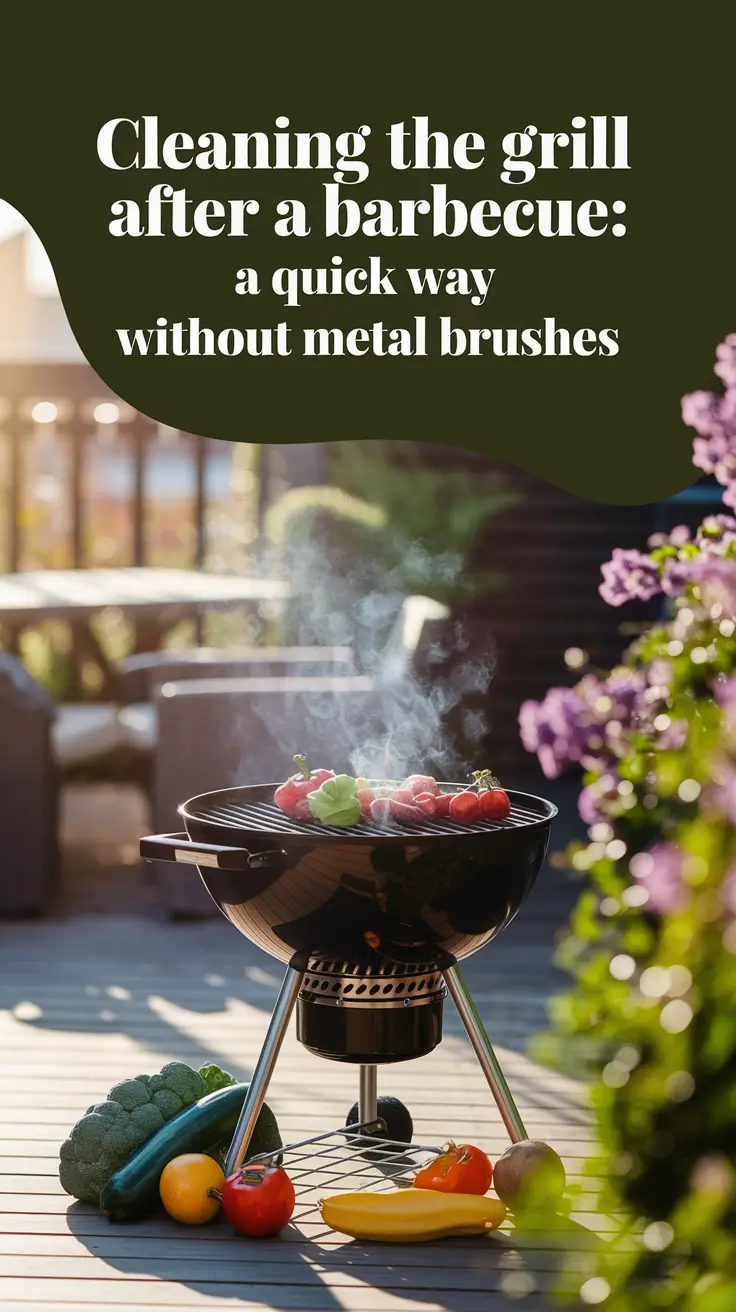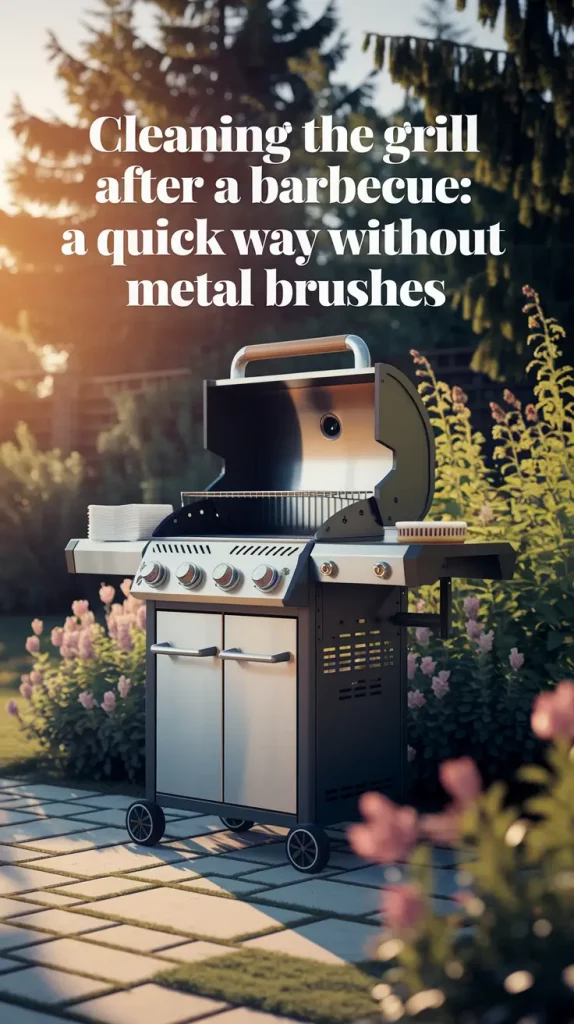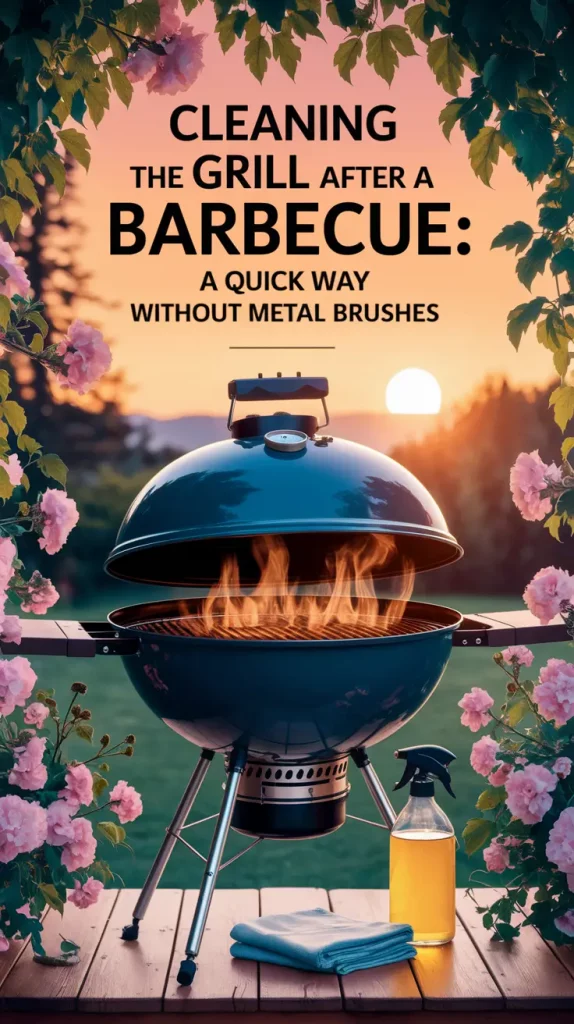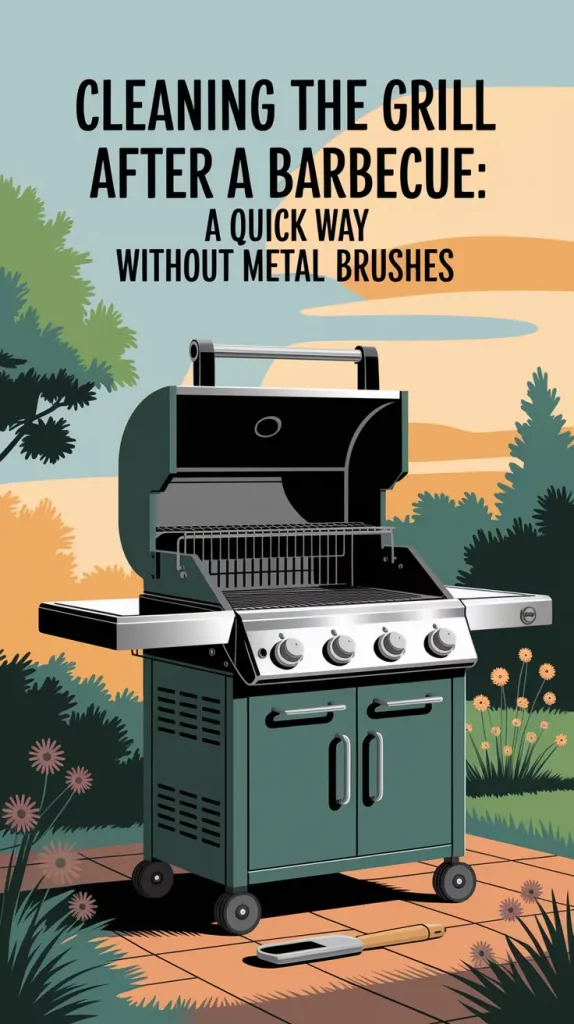
It happened again last weekend. The grill was still hot, my guests had just gone, and I was looking at the greasy grates, not wanting to clean them. I was used to the steps: pulling out a rusty brush, noticing the bristles were breaking apart, and spending more time than I liked after a relaxing night.
If you’ve ever looked at your grill the morning after a cookout, sighed, and walked away “to deal with it later,” you’re not alone. Cleaning the grill can feel as though it was created for someone who has all the right tools and doesn’t care about damaging the surface or hurting themselves.
However, there’s a way to avoid this outcome. I’ve figured out a method that’s faster, safer, and (dare I say it?) oddly satisfying. No metal brushes, no stress. I’ll show you how to clean your grill without any bristles, and explain why I won’t use them again.

Why I Ditched Metal Brushes for Good
They’re harsher than they need to be
I initially considered a metal brush to be like ketchup for hot dogs or smoke in your hair when you grill. However, as I kept using it, I realized it was cleaning more than just food from the dishes. It caused scratches, flakes on the enamel, and a feeling that I was wearing out my grill much faster than I should.
They leave behind risky surprises
The real turning point? A friend told me that he found a metal bristle stuck to a sausage. The brush broke and got stuck on the grate. That moment alone made me reconsider. I found out that having metal bristles in food is not unusual. Scary, right?
There had to be a better way
So I started experimenting. I tested out natural scrubs as well as DIY tricks, but some were successful and others were a mess. With a bit of experimentation, I found a process that functioned perfectly and ended up being a regular part of my grilling routine. And yes, it’s metal-brush free.
What to Know Before You Start Cleaning
The process of cleaning the grill is much simpler if you do it at the right time. Warm (not hot) grates are your sweet spot — think ten minutes after turning off the heat. By then, residue softens but isn’t too clingy.
Another key? Preparation. Whenever I skipped this part, I would soon notice I didn’t have a clean cloth or heat-safe tongs.
What to have on hand:
- A sturdy cloth or rough sponge
- Half a lemon or a small bowl of vinegar
- Aluminum foil (optional but helpful)
- Heat-safe tongs or a grill mitt
- Spray bottle with water or vinegar
Since I have these basics in my kitchen, using them feels much easier than using any gadget ever did.
My Go-To Method for Cleaning the Grill (No Metal Needed)
This is the part I enjoy, since after I switched, everything became simpler.
Here’s how I do it in 3 quick steps:
- Warm it up slightly: I leave the grill on low for 3–5 minutes, then shut it off. This softens food bits and makes wiping a breeze.
- Use lemon or vinegar: I grab half a lemon or a vinegar-soaked rag and scrub the grate while it’s still warm. The acidity breaks down grease naturally and smells fresh.
- Foil ball magic: For stubborn spots, I crumple foil into a ball, grab it with tongs, and rub gently. It gives just enough friction without damaging the surface.
I was surprised at how good the combo was the first time I tried it. There was no mess and no odor, and the grill seemed spotless.
When Things Get Really Messy: A Deeper Clean
It’s true that we may not clean as often as we should. Life happens. If your grill is a mess after cooking, don’t worry. Some more advanced techniques can help clean it without you having to scrub for a long time.

Try this simple deep-clean routine:
I have found that soaking grates in vinegar overnight works very well, so just put them in a tub or bag with enough vinegar to cover them. By morning, the gunk practically slides off.
Another hack? A steam bath. Put a bowl of water made from metal on a hot grill, close the lid, and let it cook for 10 minutes. It loosens debris without lifting a finger.
Here’s a quick breakdown for comparison:
| Method | Effectiveness | Effort | Safety |
|---|---|---|---|
| Lemon + cloth | ★★★★☆ | Low | ✓✓✓ |
| Vinegar soak | ★★★★★ | Medium | ✓✓✓ |
| Foil scrub | ★★★☆☆ | Medium | ✓✓ |
| Steam method | ★★★★☆ | Low | ✓✓✓ |
I switch between them, depending on how I feel that day.
Aromatic Bonus: Making Your Grill Smell Amazing
At this point, I make the experience a little more special. When the grill is clean and still warm, I put some citrus peels — lemon, orange, or grapefruit — on it. I sometimes put in a rosemary sprig or two if I want to make the dish more special.
The smell fills the room and gets rid of any remaining smoke. It’s a little thing that matters a lot, especially before you have another cookout.
It helps me feel that I am not only cleaning, but also making the space ready for the next use.
How I Avoid Grill Build-Up Altogether
This part changed everything for me. Rather than letting my grill get really dirty, I began making small efforts to keep it clean all the time.
4 habits that saved me hours:
- Quick wipe-down right after cooking (while it’s still warm)
- Monthly vinegar soak for grates (just schedule it!)
- Grill mats or foil sheets under sticky food
- Keep it covered — always. Even in summer.
Now, I do all these as habit, and my grill is always clean and ready to use.
Final Thoughts
I never imagined I’d become the type of person who has a grill cleaning system, but that’s what happened. My frustration changed into something easy and eco-friendly — without any harsh tools and just a bit of citrus to finish.
If you find grilling to be too much, perhaps you just need to be a bit gentler with it. Remember this post for the following barbecue, and let me know if you’ve tried cleaning your grill without using a metal brush.
If you are spending your summer with lots of cookouts and evenings outdoors, pin this!

